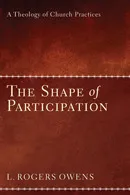The Shape of Participation: A Theology of Church Practices
By (author): "L. Roger Owens"
ISBN1606085190
ISBN139781606085196
AsinThe Shape of Participation: A Theology of Church Practices
The Shape of Participation is a work of constructive theology addressed to theologians, seminarians, and thoughtful pastors. Owens engages and deepens recent popular discussions of church practices by approaching practices from the church Fathers' understanding of the church's participation in God. Through a wide-ranging engagement with theologians, both ancient and contemporary—including Cyril of Alexandria, Maximus the Confessor, Dietrich Bonhoeffer, and Herbert McCabe—Owens argues that the embodied practices of the church are the church's participation in the life of God, making the church Jesus' own continued, peaceable embodiment in and for the world. This book is for theologians, pastors, and anyone who wants a deeper understanding of how the visible presence of God's church is extraordinarily good news in a violent world.Endorsements:"A wonderful book—Owens takes the significant interest in 'practices' that has emerged over the last decade, engages it theologically in rich ways with attention to specific ecclesial examples, and deepens it through insightful analyses of Dietrich Bonhoeffer, Herbert McCabe, and Maximus the Confessor. Pastors and scholars alike will benefit from careful study of Owens's significant argument."—L. Gregory JonesDuke University"By reframing the church's practices as a participation in Christ and, indeed, as Christ's own practicing in and for the world, Owens has brought to the study of Christian practice new theological depth, shape, and creativity. Moreover, by doing this in dialogue with ancient as well as contemporary theological and philosophical sources and in a way that takes seriously the concrete, embodied church rather than remaining on the level of idealized and abstract ecclesiology, he has provided us a helpful new model for thinking about what it means to be the church."—Bryan StoneBoston University School of Theology

